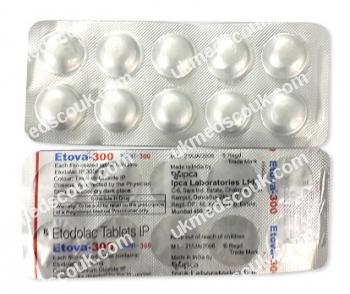Suosittelut
Tuotekuvaus
Tähän tuotteeseen liittyviä arvosteluja ei ole tällä hetkellä saatavilla, voit siis nyt ensimmäisenä lisätä oman arvostelusi tai lukea Suosituksia-sivulta lisää aiheeseen liittyvistä tuotteista.
Lisää Arvostelu
Arvostelusi odottaa moderaatiota.
Common use
Etodolac is a non-steroidal anti-inflammatory drug (NSAIDs). It works by reducing hormones that cause inflammation and pain in the body. NSAIDs treat the symptoms of pain and inflammation. They do not treat the disease that causes those symptoms.
Etodolac is used to treat pain or inflammation caused by arthritis or osteoarthritis. It also reduces pain, swelling, and joint stiffness from arthritis.
Dosage and direction
Take this medication by mouth with a full glass of water (8 ounces or 240 milliliters) unless your doctor directs you otherwise. Do not lie down for at least 30 minutes after taking this drug. If stomach upset occurs while taking this medication, take it with food, milk, or an antacid.
Precautions
Before taking Etodolac, tell your doctor or pharmacist if you are allergic to it; or to aspirin or other NSAIDs (e.g., ibuprofen, naproxen, celecoxib); or if you have any other allergies. Before having surgery, tell your doctor or dentist that you are taking this medication. Before using this medication, tell your doctor or pharmacist your medical history, especially of: kidney disease, liver disease, poorly controlled diabetes, stomach/intestine/esophagus problems (e.g., bleeding, ulcers, recurring heartburn), heart disease (e.g., congestive heart failure, history of heart attack), stroke, high blood pressure, swelling (edema, fluid retention), dehydration, blood disorders (e.g., anemia), bleeding or clotting problems, asthma, growths in the nose (nasal polyps).
Contraindications
This medication may be harmful to an unborn baby. Tell your doctor if you are pregnant or plan to become pregnant during treatment. Taking Etodolac during the last 3 months of pregnancy may harm the unborn baby. Do not use any other over-the-counter cold, allergy, or pain medication without first asking your doctor or pharmacist. Do not drink alcohol while taking Etodolac. Do not use this medicine just before or after having heart bypass surgery (also called coronary artery bypass graft, or CABG).
Possible side effects
Stop taking Etodolac and seek medical attention or call your doctor at once if you have any of these serious side effects:
chest pain, weakness, shortness of breath, slurred speech, problems with vision or balance;
black, bloody, or tarry stools;
coughing up blood or vomit that looks like coffee grounds;
swelling or rapid weight gain;
urinating less than usual or not at all;
nausea, stomach pain, low fever, loss of appetite, dark urine, clay-colored stools, jaundice (yellowing of the skin or eyes);
fever, sore throat, and headache with a severe blistering, peeling, and red skin rash;
bruising, severe tingling, numbness, pain, muscle weakness; or
fever, headache, neck stiffness, chills, increased sensitivity to light, purple spots on the skin, and/or seizure (convulsions).
Less serious Etodolac side effects may include:
upset stomach, mild heartburn or stomach pain, diarrhea, constipation;
bloating, gas;
dizziness, headache, nervousness;
skin itching or rash;
sore throat, stuffy nose;
blurred vision; or
ringing in your ears.
Drug interaction
This drug should not be used with the following medications because very serious interactions may occur: cidofovir, ketorolac.
Before using this medication, tell your doctor or pharmacist of all prescription and nonprescription/herbal products you may use, especially of: anti-platelet drugs, oral bisphosphonates, "blood thinners", corticosteroids, cyclosporine, desmopressin, digoxin, high blood pressure drugs, lithium, methotrexate, pemetrexed, probenecid, SSRI anti-depressants, "water pills" (diuretics such as furosemide, hydrochlorothiazide, triamterene).
Missed dose
If you are prescribed this drug on a regular schedule (not just "as needed") and you miss a dose, use it as soon as you remember. If it is near the time of the next dose, skip the missed dose and resume your usual dosing schedule. Do not double the dose to catch up.
Overdose
Seek emergency medical attention if you think you have used too much of this medicine. Overdose symptoms may include nausea, vomiting, stomach pain, drowsiness, black or bloody stools, coughing up blood, shallow breathing, fainting, or coma.
Storage
Store the product at room temperature between 68-77 degrees F (20-25 degrees C).
Store the medication away from light and moisture. Do not store in the bathroom. Keep all medicines away from children and pets.
Disclaimer
We provide only general information about medications which does not cover all directions, possible drug integrations, or precautions. Information at the site cannot be used for self-treatment and self-diagnosis. The specific instructions for a particular patient should be agreed with your health care adviser or doctor in charge of the case. We disclaim reliability of this information and mistakes it could contain. We are not responsible for any direct, indirect, special or other indirect damage as a result of any use of the information on this site and also for consequences of self-treatment.
















 Toimitus
Toimitus